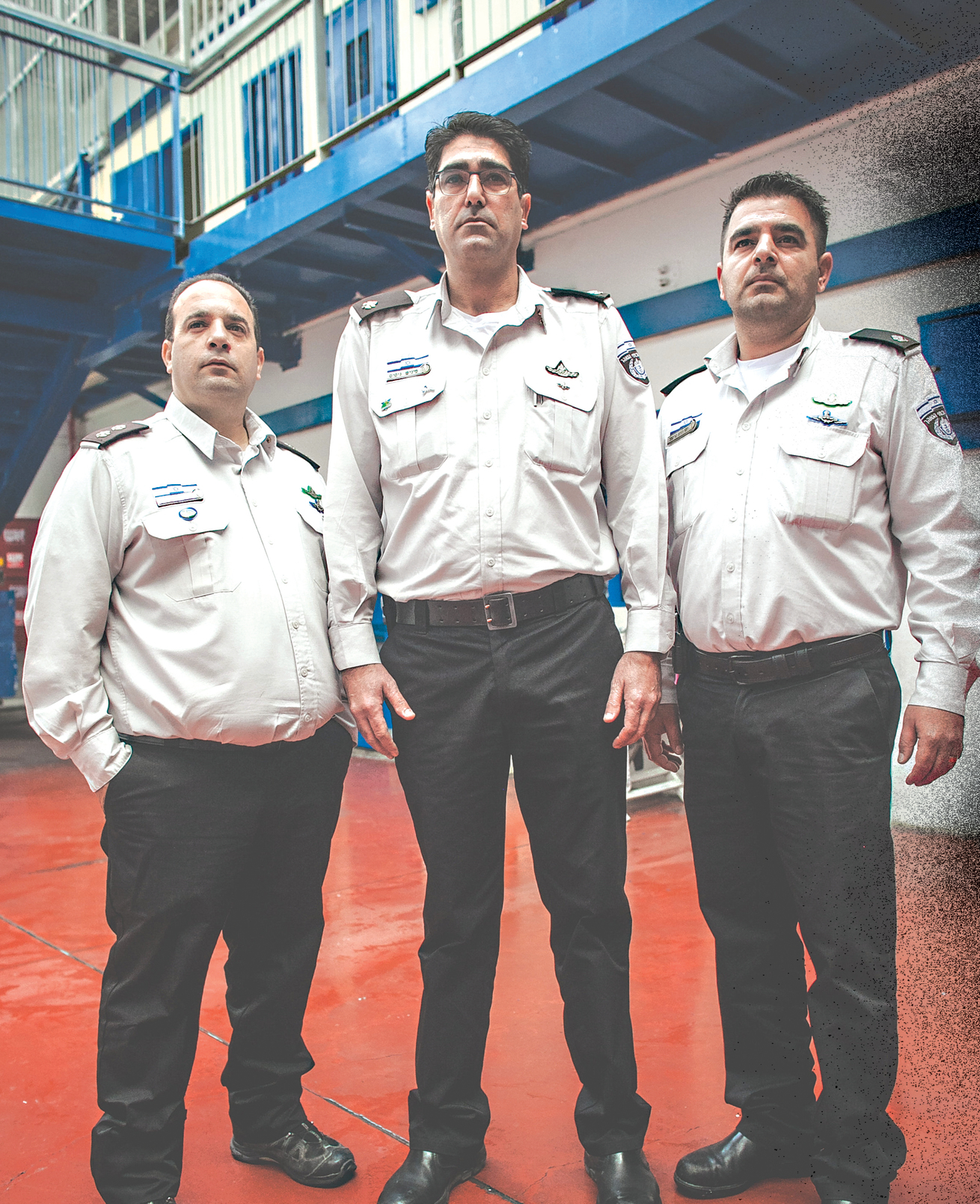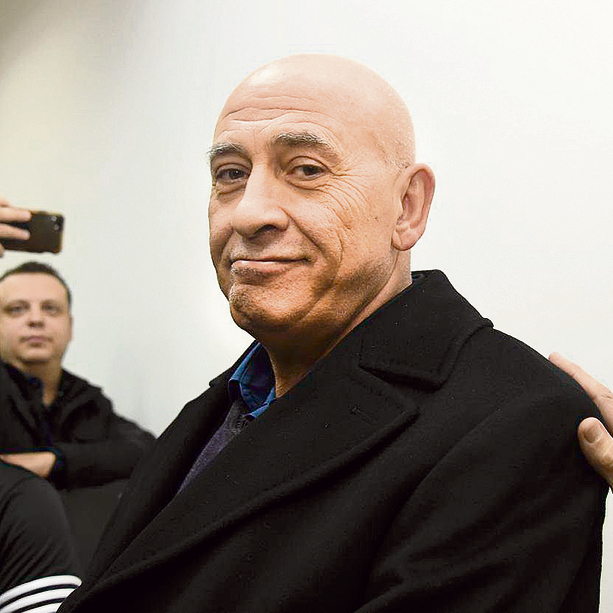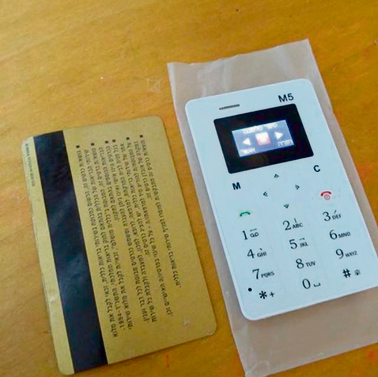
Preventing the next terror attack from Israel’s prisons
There are about 6,200 security prisoners in eight of the Israel Prison Services’ detention facilities, and 70 percent of them are defined as having blood on their hands. In a joint interview, three intelligence officers serving in Israel’s most dangerous prisons discuss what it is like to be in the same room with eight murderers, how inmates are turned into informants and how MK Ghattas was caught allegedly smuggling cellphones into jail.
Following his arrest, the work of the Shin Bet and the Israel Prison Service’s security system received wide coverage. Not much was said about the secret work of the intelligence officers who locate and operate agents in the security prisons, those who work behind the scenes in the most sensitive position in some of the most dangerous places in Israel.

In order to understand how it really works, we brought together for the very first time three intelligence officers of security prisoners: The intelligence officer of the Gilboa Prison (600 security inmates), Chief Superintendent Nissim Finish; the intelligence officer of the Ktziot Prison (2,000 inmates), Deputy Commissioner Dudu Vaknin; and the intelligence officer of the Nafha Prison (750 inmates), Chief Superintendent Yossi Krispel.
The three spoke candidly about their work in the shadow of danger and their daily meetings with arch-murderers, the recruitment of agents in the prison and providing them with protection, the language and codes and the heavy responsibility to prevent and thwart attacks. “It’s an Israeli invention,” they told us. “This is a position that only exists in Israel, and people come here from all over the world for guidance.”
Deputy Commissioner Vaknin, how did you catch MK Ghattas?
“The entire activity was carried out following information obtained by the Shin Bet. Prisoner Walid Daka, who was convicted of murdering soldier Moshe Tamam in 1984, is a member of the Balad party central committee. It turned out that MK Ghattas had visited him three times: Once at the Hadarim Prison, a second visit at the Ramon Prison and a third one in Ktziot.
“We received information that he was planning to smuggle cellphones to Daka. Following the information, we carried out an operation with the Israeli Prison System’s intelligence division and the Dror Unit, which is the operational wing of the IPS. On the day of the visit, he came in, was asked “Do you have anything you are not allowed to bring in?” and replied, “No.” He passed through the metal detector and it didn’t make a sound.”

Why didn’t you search him?
“Because as far as we’re concerned, from the moment we asked him and he said he wasn’t carrying a thing, we are not allowed to search him, since he is a Knesset member and enjoys immunity. But the fact is that written material and 12 cellphones were found in the cells of the prisoners he visited.”
During the discussion to revoke MK Ghattas’ immunity, it turned out that the entire process of transferring the envelopes was documented on video, and that 16 SIM cards, two chargers and an earpiece were also found in the prisoners’ cells.
What did the written material contain?
“It’s sensitive intelligence information.”
Cellphone smuggling is not the only thing that is foiled in jail. There are about 6,200 security prisoners in eight of the IPS’s detention facilities: Gilboa, Megiddo, Damon, Ofer, Nafha, Ramon, Ktziot and Shikma. Seventy percent of them are defined as having “blood on their hands” – terrorists who were caught on their way to carry out suicide bombings, those who planned to carry out a major attack and changed their mind at the last minute, those who dispatched terrorists, those who planned and executed attacks, engineers responsible for preparing explosives and explosive devices, senior members of the Palestinian terror organizations, and more.
In the prison, these dangerous terrorists are constantly under the watchful eye of the intelligence officers, who receive a lot of information on the situation inside and outside the prison: Starting from escapes planned by inmates sentenced to long jail terms; through the preparation of improvised explosive devices, plans to attack wardens and staff members, revolts, hunger strikes and cellphone smuggling; to information on attacks executed outside, terrorists being dispatched, preparations of explosive charges, locations of weapon caches, plans to kidnap soldiers, etc.
Vaknin reveals, for example, how the Shin Bet learned of the identity of the person who drove the terrorists that carried out the deadly attack at Tel Aviv’s Sarona compound last June. “An inmate in the prison knew who the driver was. We transferred the information to the Shin Bet, and they caught 23-year-old Salim Mognam of Yatta, who was questioned, confessed and was arrested for driving the terrorists.”

1. Soldier abduction plan
It was time for the daily walk at the Gilboa Prison, the most guarded security prison in Israel. When the inmates walked out of the ward and spotted Chief Superintendent Nissim Finish, the jail’s intelligence officer, standing there, they approached him and shook his hand. One of them slipped a note into his hand. Chief Superintendent Finish did not respond. The man was an informer of his, and he knew that any small movement or wrong response would place his source in danger. He kept smiling and shaking the hands of the rest of the security prisoners, until the last of them left.
What did the note contain?
“A detailed soldier abduction plan, including the name of the prisoner who planned the kidnapping, the names of the people involved in it, where it would take place and when. We handed the information over to the defense officials. They instructed us to separate the plan’s mastermind from the rest of the prisoners. The information was checked and verified. The entire terror infrastructure was caught. We managed to thwart a soldier’s abduction.”
What motive is the prisoners’ motive to plan a kidnapping?
“Their desire to be released. They want to get out of jail in a swap deal, like the one with (kidnapped soldier) Gilad Shalit. Our job is to try and thwart it.”
2. Four phones under prisoner’s potbelly
The heavily built terrorist clumsily moved towards the visitors’ room at the Nafha Prison under the watchful eye of the prison’s intelligence officer, Chief Superintendent Yossi Krispel. “He is a security prisoner who was jailed for carrying out several attacks. That day, he was meeting with his lawyers before going up to the Parole Board,” Krispel says, adding that “we knew they were planning to smuggle a cellphone to him.”And what happened?
“When he came out we conducted a thorough search on him, but couldn’t find a thing, although the metal detector beeped. We suspected that the prisoner had shoved the smuggled cellphone into his body. I threatened to make him sit in front of the wardens in the nude until it came out, and then he gave in. We are talking about a massive, fat prisoner. He lifted his huge potbelly, and it turned out that he had tied four cellphones connected with a thin thread under it. That’s how they were seized.”
If it were not for the preliminary information, the smuggling would have likely not been uncovered, but that is the essence of the intelligence officers’ work.
“The intelligence officer is the person who receives all the inmates upon their arrival at the prison,” says Deputy Commissioner Vaknin. “He reads the indictment against the prisoner and his security-related past and holds a meeting with him to get an initial impression. It means sensing him, smelling him, looking him straight in the eye. The basis for a good intelligence officer is his interpersonal interaction. If he doesn’t have that, he won’t be able to receive information or draw information.”
Deputy Commissioner Vaknin has been serving in the IPS for 20 years, 13 of them in the intelligence field. “I founded the intelligence system in Ktziot when it was handed over to us from the IDF in March 2006. There were 1,200 prisoners there and I had to start it all from scratch. Get the know the ground, the prisoners, the dominant figures. I started checking them out one by one in interviews and marking those who seemed like potential agents. When the new Ramon Prison was opened in December 2006 for security prisoners, I was appointed as its intelligence officer. I served for two years as the intelligence officer in charge of the two security prisoners’ wards in the Eshel Prison, and moved to Ktziot from there three years ago.”
Vaknin used to be the commander of Chief Superintendent Krispel, the intelligence officer of the Nafha Prison, who has been in the IPS for 14 years, five of them in the intelligence field.
“Part of my job is to locate potential for this position among the staff members,” Vaknin explains. “I check whether the person is of high caliber, thorough, sophisticated, accomplishes missions, how he questions prisoners, what kind of relationship does he have with them, how he deals with a brawl or incitement. I gave him a test without him knowing. I told him about a prisoner who was keeping a cellphone in his cell and asked him to collect open information about him: When he entered and left the cell, monitoring through cameras, conversations about him with prisoners – without exposing the information about him to anyone.”
“He said to me, ‘You my confidant in this matter,’ and a week later the prisoner was caught,” Krispel recounts. “The move from a security prisoners’ warden to intelligence was hard on me. After completing an officers’ course, I suddenly found myself in the security system, sitting with the most dangerous and tough prisoners in one-on-one talks, or being alone with them as they take a walk in the yard.”
Sounds scary.
“When the IDF arrests a terrorist, it backed by half the country,” says Finish. “I enter a ward of 120 convicted murderers, just like that, with nothing, or sit in a room with eight terrorists. I have a family and daughters and it’s a risk.
“I have been in the IPS for 19 years and three years in intelligence. I started out as a warden, a sergeant, an intelligence non-commissioned officer, and then I went to the officers’ course. I did a lot of training, including a basic intelligence course, learning Arabic, courses on the history of Islam and learning the Quran in Hebrew.”
Does that make it any less scary at least?
“I sit in front of the terrorist who carried out the murderous attack at the Park Hotel in Netanya, and I’m supposed to be all chummy with him and earn his trust. You learn not to expose your emotions in this story. You have to neutralize it.”
He is a murderer of Jews and you’re a Jew. Aren’t you afraid that he’ll try to hurt you?
“He wouldn’t dare. There is a profit and loss balance here.”
“The security prisoners know that the dominant figure in the jail is the intelligence officer,” says Vaknin. “They understand that if, God forbid, someone hurts him, it will result in severe punishment for everyone and aggravated living conditions. They can attack a regular warden, and that does happen.”
Intelligence officers have been attacked in the north in the past.
“A few intelligence officers were attacked by terrorists,” Krispel admits. “Two required medical care. One had a broken leg. That’s the risk in our job, and we are aware of it.”
“There are few incidents like that,” says Vaknin. “The security prisoners’ mentality is that if I come to visit one of them in the ward, I am considered his guest. He won’t let anyone hurt me.”
According to what criteria are they placed in the ward? And if they are so dangerous, why put them together?
“They are placed according to our interest. We read each prisoner’s file, his background, the area and organization he belongs to. I can put him with his guys or separate them. We of course take advantage of their political or interorganizational conflicts.”
How many of them are really ideological prisoners?
"Ninety-eight percent of them are in jail on an ideological background and only 2 percent are criminals,” says Vaknin. “They are prisoners with a high intelligence level. They live as a collective. They have a strict organizational system, with position holders who are elected every six months, an open and concealed leadership and strict discipline rules.”
“That’s when we talk about the old generation,” Krispel adds. “But in the Facebook generation, the lone-wolf terrorists who have been arrested in the past year are people who did not grow up in an organization and are not driven by an ideology, but by incitement on social media. We recently had a soldier’s murderer, who was a lone-wolf terrorist who failed to integrate into an organization. It’s a generation influenced by the media.
“A prisoner affiliated with the Islamic State, who stabbed a policeman at Jerusalem’s Old City, explained to me that one of the things that made him carry out the attacks were the videos he saw on social media. He traveled to Turkey and from there to Syria, and after fighting with ISIS for eight month, he returned to Israel to start a terrorist cell here. In order to give his soldier a personal example, he went to carry out an attack.”
3. Every prisoner has a price
The top security prisoner who visited Finish’s office at the Gilboa Prison was in personal distress. He asked to make things easier for a person who was very important to him.
“In a security prison, the most important person to the prison warden is the intelligence officer, and the security inmates are aware of that,” Finish explains why he was approached. “My motto is that every prisoner in the jail has a price. I promised him to look into it.”
Meaning?
“To check if it would be worthwhile exploiting his sensitive situation to recruit him as an agent and what benefit we could gain from him. I checked with all the relevant elements whether it would be worthwhile for the state to accept his request. We are talking about quite a difficult prisoner, with a high status, with ties inside and outside the prison.”
What did you get in return?
“He revealed hiding places of cellphones in the ward, told me about smuggling and concealing methods, provided information about position holders within the prison, who were also relevant to our security elements. We helped him with that person and recruited him too.”
What motive do other prisoners have to become agents?
"It’s difficult,” says Krispel, “but it’s possible, because every person has something that will make him talk. Even if it’s the most dangerous and cruel murderer or a leader who obtained power, status and ability.”
“There is a strong emotional, personal and social motive,” adds Finish. “An inmate moves from prison to prison, without knowing what is going on with his parents and loved ones. He is in a sensitive state. He is not allowed to call or receive visits. He is sentenced for long terms and he misses his family.”
“For a phone call, contact with the family, financial help, buying at the canteen – he may talk,” says Krispel.
How do you know who has sensitive information?
"You start by reading his file, the unconcealed details,” Vaknin explains. “Then you monitor his lifestyle. If he is a religious person – does he pray five times devoutly? He has to be one hundred percent assimilated among the prisoners, to have access to the organization members and to the senior management.”
How long does it take to recruit and train an informer?
"It took me a year to work on recruiting such a dominant guy. At first, he didn’t realize that I was recruiting him. I picked him because he was dominant in the organization he belonged to and was connected to the entire leadership, inside and outside the jail, through family visits, lawyers and MKs. It was worthwhile making the effort to recruit him. When he feels committed to me, I ask him, ‘Do this and that,’ and then he starts realizing that he is basically my source.”
How do you know that the information is reliable and where do you transfer it?
“Every piece of information is transferred for examination by the the security elements. We have full cooperation.”
How does the prisoner transfer you the information?
“Everything that goes on in the prison passes through the intelligence,” says Finish. “Starting from the daily routine, the walks in the yard, going out to the court, to the clinic. If he is a good source, he will already find the way to get to me.”
And how do you protect him?
“We operate sources. We work with people whose life really has to be protected in the prison. If the prisoner is in court, I will talk to him there, and no one will see me. If I have to dress up or arrive in civilian clothes, I’ll do it. There are a thousand ways to be careful and watch him, because my source must not be uncovered.”
Has is happened that a source was exposed?
“Yes, it happens,” Vaknin replies. “A decade ago, there was an inmate who was suspected of collaboration. They tortured him with a hot plate, burned him. And there have also been cases in which prisoners were murdered.”
4. Cellular technicians in the prison
Those permitted to visit security prisoners include their lawyers and Knesset members.
“The IPS is aware of the fact that the lawyers serve as a pipe for transferring information in and out. The Palestinian Authority pays a lawyer NIS 500 for each visit. If he sees four or five prisoners a day, it reaches NIS 2,000 and more. They are not searched, but they pass through a metal detector. The finger-sized telephones, which are specially manufactured in the territories, don’t beep. All their parts are removed and only the brain is left.”
“There are inmates in the prison who are expert cellular technicians, who work 24 hours a day,” Krispel adds.
Smuggling cellphones into the prison is the biggest problem. Vaknin says he once received information about a large number of phones smuggled into the prison through the vegetable boxes that arrive at the kitchen. A search revealed 50 cellphones in the parsley packs.
“The bottom line is that we are talking about a lot of money, hundreds of thousands of shekels,” says Krispel. “Every such phone costs a prisoner NIS 30,000 to NIS 50,000. The money is transferred to families from the organization they belong to.”
How does it work?
Vaknin explains that “a prisoner who knows criminal illegal aliens who are in jail for murder relay a message to them through visiting relatives them that he is willing to pay hundreds of thousands of shekels if they smuggle him a phone. That inmate will try to smuggle it through criminal organizations. He will make NIS 200,000 on four devices within two seconds.”
And how did they plan to pass it on to the prisoner?
“A prisoner is allowed to have physical contact with a baby. He takes it from the baby, wraps it up in a condom and shoves it into his body. An unemployed person outside is given NIS 10,000 to throw stones at a roadblock. He will arrive at the prison and make sure that the cellphone passes through a certain point. It is hidden in tin cans, in shoes, in prostheses, in packs of dates, in canteen products and even in a credit card.”
What was the most surprising smuggling?
“In a prayer chain. At the Nafha Prison there was information about an inmate who sat in the same cell with three people considered heavy prisoners. One was a chemical engineer with extensive ties outside. They created notes the size of a pistachio nut, where all the information that had to get out was coded: How to produce explosive devices from certain substances, who holds weapons and where are they hidden. On the day of the release, the chain was found with 33 beads. We broke the first bead and found a note containing all the information.”
How did they prepare it?
“They melted the plastic bead with a lighter, inserted the note written in very small, encoded writing, and coated the bead again. If it were not for the early information, we wouldn’t have caught it.”
5. Prevention, flops and codes
The intelligence officers’ nightmare is prisoners escaping from the prison.“I received information two years ago,” Finish says, “that there was a tunnel in the cell of two Islamic Jihad prisoners. We found a narrow tunnel that they had dug with a teaspoon. They managed to break the leg of a bed, pulled out the toiler bolt in the bathroom and put the leg back, and no one noticed. There have been similar attempts in recent years. We brought a combat engineering unit and they found a tunnel. They are construction people. the land in the Beit She’an area is agricultural and it’s not hard to dig in it. They dug through the bathroom and the shower, and the uncovered tunnel was almost 3 meters long. Their plan was to reach the wall and escape from there.”
Have wardens ever crossed to the other side?
“That has happened, unfortunately, but sometimes their attempts to get someone to change sides work in our favor. A year and a half ago, for example, they turned to a jailor, an 18-year-old soldier in compulsory service. They said to him, ‘What’s your salary? You can make 50,000 shekels in a second.’ They wanted him to smuggle them a phone from the outside. The soldier immediately reported it to me and we operated him as an agent.”
Do they have a language and codes?
“They don’t talk as much as they pass codes through notes and conduct.”
"If everyone wears sneakers on a given day, it’s a red light that there is a lot of tension. It can happen before a brawl, a plan to attack a warden, disturbances and riots. That’s how we realize there is a bombastic event we should prepare for.”
“If they order salt, milk, apricots or honey from the canteen, it means that they are about to launch a hunger strike,” Krispel adds. “They swallow the salt and it protects their stomach during the strike. If a prisoner gains weight, it means that he is about to start a hunger strike.”
“If they change the daily routine, for example five people taking a walk in the yard instead of 30 or 40, it means that there is something going on in the ward,” says Vaknin. “It’s either something internal, or an organization of something serious.”
How do they convey messages?
“Most of the things are done in encoded writing.”
“They call it ‘flavors.’ It’s a message from their management to prepare for a hunger strike and for a protest move,” says Krispel. “They must get everyone on it, and it’s done through inmates going to the clinic, at the canteen, etc. They take the first word, for example, and then every tenth word, and make a sentence out of it.”
What would be considered your greatest achievement?
“The main goal of every intelligence officer is to prevent a security prisoner’s escape,” says Finish. “That’s the biggest achievement as far as I am concerned.”
“And preventing terror attacks is as important,” Vaknin adds.
“We also prevent the smuggling of sperm from the prison,” says Krispel. “Prisoners sentenced to life want to continue the dynasty, and they smuggle sperm outside in snacks, waffles, bagels. An ice container waits outside, and the sperm is passed on.”
Do you also have flops, missed opportunities?
“In the intelligence field, we always put together a puzzle in order to prevent an event or damage to the state’s security,” Vaknin replies. “There have been cases we missed out on by not continuing to collect information.”
“On the other hand,” Krispel adds, “do you know how many things we’ve thwarted? We’re not looking for a pat on the back.”











